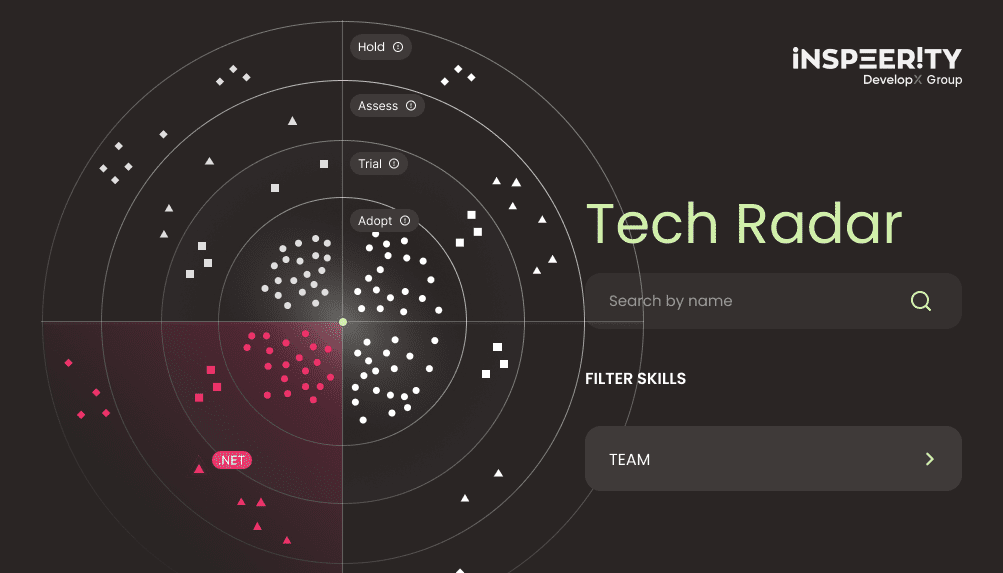Working with an external software firm brings up one interesting question: who owns the software? And it’s an important one. Intellectual Property Rights can relate to a wide area, from your grandma’s cookie recipe, to code a developer writes, to artwork you’ve created in a rush of inspiration. And protecting these rights can mean the success of your project. So, how can software be protected as intellectual property?
Table of contents:
- The importance of software intellectual property protection
- Copyright of software – three main areas
- Ownership of code during software development
- Registration of intellectual property for patents or trademarks during collaboration
- Going beyond the law: additional measures for software intellectual property protection
- How to protect software intellectual property when collaborating with an external software partner?
The importance of software intellectual property protection
You may ask why this is so important, and why IP should be treated specially. I believe everyone has experienced this unpleasant situation when your brilliant idea was crassly used by someone else. Theft is always a dreadful experience and when it comes from a “partner” it ruins relationships and trust. Trust and openness build strong relationships, personal and business. That’s why companies put such stress on protecting this type of data.
Copyright of software – three main areas
Where IPR applies to your project depends firstly on the type of software being created. In short, there are three main areas where software copyright protection could fall. These are discussed in the initial contract negotiations.
Third-party software
Often, developers will use third-party or open-source software. It’s important to note that the copyright of software for these third-party packages cannot be assigned to you, and your software must operate within the terms of the license for their use.
As a rule, the development partner provides a full list of all software packages used and that they meet all associated terms. Additionally, they should provide a warranty that they have not infringed on third-party IPs.
Software development partner intellectual property
Sometimes, companies may have pre-existing in-house software packages. These are often used across multiple projects when needed. It is recommended that you ask for a list of this software and the associated terms of use. This will help ensure that you are aware of any restrictions or limitations that may apply to the software being used in your project.
Bespoke intellectual property
This is software code specifically designed and created for a client. Here ownership of the code will be transferred to you and all details are set out during the initial contract signing. Make sure you have an agreement at the outset of the project detailing and confirming when this IP transfer will happen.
Ownership of code during software development
Creating software is often a long process, containing lots of moving parts. It may be hard to tell who owns what at each stage of the project. All details will be laid out in the contract negotiations, in short, ownership of all code belongs to the development partner until the moment of transfer.
The moment of transfer and the clauses linked to it will be set out in the contract. I know, there’s a running theme here, it’s all in the contract. But not all projects are the same.
When does the transfer take place? My favorite expression comes into play: “It depends”. The moment of transfer may change depending on the type of project and the work schedule. It may also depend on when the code was created.
Software companies, and we’re no exception, will often hold code until payment is received. Once the date of transfer is confirmed, all code will be transferred to its unique repository for protection. From here on the code belongs to the customer and all rights are transferred to them.
Registration of intellectual property for patents or trademarks during collaboration
I will take a bit of your time here to explain that we won’t register any trademarks regarding software created for a client’s project. Our business is to create custom solutions. As a result, we won’t register the IP rights for ourselves. As we assign the rights to any software across to the client at the moment of transfer, they are responsible for applying for any trademarks if applicable.
If you’re curious about the topic, there’s more information about custom software development.
Going beyond the law: additional measures for software intellectual property protection
When it comes to protecting your IPR, a clear agreement, made at the start, always helps to avoid conflicts later. However, that still doesn’t help answer the specifics about “how will you protect my IPR?”
All companies must work with the local law regarding data protection and IPR. That’s a given. Companies based in Europe must follow EU regulations, most notably the Directive on the Enforcement of Intellectual Property Rights.
Best practices when working with an external software partner
However, the law doesn’t always cover good practices. Here, companies can go one step further in protecting your software intellectual property. As always, this should be covered in the initial contract signings. The following best practices can help to secure your IP while working with an external software partner.
- Limiting who has access – as a rule, code and any related data should be stored in different server repositories for every project. This means that all projects are kept separate from one another. This also means only the people working directly on the project have access to the data. It might, in rare situations, be granted to either a tech lead and/ or a delivery lead if they are involved, but usually, those roles do not need direct access to the code.
If you are still worried about protecting your software IP, in your negotiations you may also be able to request the following services.
- Dedicated Networks – A private network that doesn’t share internet or local network access with other people outside the project.
- Dedicated office zones – Where team members are limited to working on projects in selected areas. Here, only people who are personally involved in the project have access.
- Dedicated equipment – Where only selected equipment can be used on the project, this can be provided in-house, or you may be able to send your equipment for the team to work on.
- NDAs – To protect your data, companies can be requested to sign NDAs to add an additional level of protection.
If in doubt, bring up your concerns during the initial talks. The software company should be able to take you through all the measures they are willing to put in place.
How to protect software intellectual property when collaborating with an external software partner?
Working with an external software partner can bring many benefits to your business, but it also raises important questions about Intellectual Property rights.
Protecting your IP is crucial to the success of your project. It is important to address these issues and to have a clear agreement with your software partner at the outset. Ownership of Intellectual Property is typically laid out in the contract negotiations. Here, the ownership of code lies with the developers until the moment of transfer.
Finally, should any disputes arise, they can be tackled on a contractual level, and there are clauses within the contract that can protect your rights as a customer.
By following best practices and establishing clear agreements, businesses can work collaboratively with external software firms to create successful projects and protect their intellectual property.




